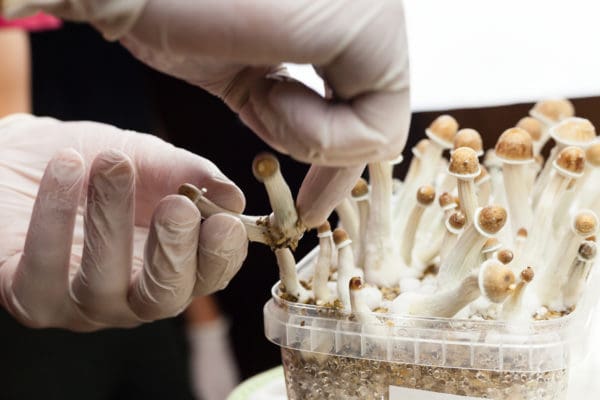Medical Editor: Dr. Benjamin Malcolm, PharmD, MPH, BCPP
Pseudonyms were used in this article to protect the privacy of the individuals who shared their stories.
Eating disorders are complex conditions that affect eating, social functioning, and health. Nine percent of people will experience an eating disorder in their lifetime, with the prevalence three times higher in women than in men. Eating disorders have a high risk of mortality and suicidality. They are also among the most resistant to conventional treatment. As research emerges, some are curious and even experimenting with whether psychedelics could provide some relief or even a cure for eating disorders.
For example, meet Luke and Mary:
Luke is an eating disorder survivor, and tells us how LSD helped them with embodiment:
“I had shown signs of body dysmorphic disorder, anorexia, and bulimia nervosa since a very young age. When I went into remission for bulimia, I still struggled with feelings of self-loathing, especially around my body. Journeying with LSD unlocked a felt sense of presence and belonging in my body which I never had access to previously. When the journey was over, I could revisit that feeling of embodiment and use it to further my progress in psychotherapy. The trip created an access point for me to feel comfortable in my skin for the first time.”
Mary is in recovery from a combination of eating disorders, and reports that although she had been diagnosed with PTSD, she didn’t realize that she had an eating disorder until after taking LSD with a friend:
“I didn’t know until that night that the disordered eating was flying under the radar for most of my life; the awareness just emerged with a bunch of memories and insights. It was a true eureka moment, and I was almost immediately able to trace back to childhood to the times that my abusive father criticized my body and used food to control my behavior.” After that, she sought therapy to integrate the experience and further explore the events that led up to her disordered eating behaviors which led to remission which she sustained over a year later. “Once I saw the behaviors and the origins, then I was able to forge a new relationship with my body.”
Luke and Mary’s stories of healing and re-alignment of mental and physical bodies with psychedelics are not anomalies. In this article, we explore the potential of psychedelic therapies for the treatment of eating disorders.
What are eating disorders?
The Diagnostic and Statistical Manual of Mental Disorders, or DSM-5 (Fifth Edition, 2013), lists the three most common eating disorders as anorexia nervosa, bulimia nervosa, and binge eating disorder. There is also a condition that takes into account any combination of these, called eating disorder not otherwise specified. Individuals with eating disorders have the highest mortality rates (up to 10%) of all mental health conditions, with anorexia being especially deadly..
The most common eating disorder, binge eating disorder, is characterized by eating large amounts of food in a short time while lacking a sense of control. Binge eating disorder has been compared to substance use disorders and referred to as ‘food addiction’. Complications of binge eating disorder may involve acid reflux, weight gain, high blood pressure, and cholesterol, or diabetes.
While bulimia nervosa shares symptoms of binging with binge eating disorder, there are compensatory purging behaviors such as vomiting that also occur. This can introduce risks of electrolyte imbalances or damage enamel that covers teeth. Anorexia is the deadliest eating disorder and is characterized by extreme restriction of calories, low body weight, paralyzing fear of weight gain, and distorted body image. This can lead to death by starvation, physical complication (e.g. cardiac arrhythmia), or suicide and can be one of the most difficult mental disorders to treat successfully
Eating disorders such as bulimia and anorexia involve high levels of rigid thought and rumination. Ruminative thoughts occur when an individual has repetitive mental fixations, preoccupations, obsessive thinking, or distressing thoughts related to the concept of self, past trauma, or concept of the body or self.
Trauma and Eating Disorders
Experiences of self-loathing and body dysmorphia are common for individuals with eating disorders, as these people experience a disconnection between the self and the body. The many co-occurring mental health conditions with eating disorders make them even more challenging to treat. Trauma seems to be a common thread.
Post-traumatic stress disorder (PTSD) often correlates with eating disorders. PTSD can ensue after experiencing, witnessing, or learning about a traumatic event; DSM-5 criteria include symptoms of intrusive and recurrent traumatic memories through flashbacks or dreams, avoidance of trauma-related cues, shifts in mood and arousal levels, psychological distress, and physiological reactions. PTSD correlates higher with those who have binging and purging behaviors which could be an attempt to numb or otherwise manage trauma symptoms. Individuals with eating disorders may have had childhood experiences of physical abuse, emotional abuse, and neglect.
Treatment for eating disorders usually includes cognitive-behavioral therapy (CBT) as the primary focus, but other modalities such as eye movement desensitization reprocessing (EMDR) and forms of exposure therapy can also be utilized.
A potential new option for eating disorder treatment that shows promise is psychedelic-assisted psychotherapy. The Multidisciplinary Association for Psychedelic Studies (MAPS) and Johns Hopkins University are at the forefront of research related to the treatment of both PTSD and trauma connected to managing life-threatening conditions. These studies are exploring the use of substances such as 3,4-methylenedioxymethamphetamine (MDMA), which is a different class of psychoactive substances, or psilocybin (a psychoactive compound in psychedelic mushrooms) while under the care of physicians and trained therapists, to promote healing.
MAPS is studying the safety and efficacy of MDMA-Assisted Psychotherapy in the treatment of PTSD, which is in Phase III trials in the US, Canada, and Israel. If this intervention is approved by the FDA, the treatment could be prescribed off-label for people struggling with eating disorders by a psychiatrist working with MDMA-assisted psychotherapy trained therapists.
Could psychedelics help people recover from eating disorders?
More research is needed to determine whether psychedelics can help people recover from eating disorders and body dysmorphia, although there is much excitement and research planned.
A survey study of individuals with eating disorders found that after a psychedelic experience, measures of depression went down and emotional well-being increased. The researchers suggest that this shows promise for psychedelics as agents of healing for people with these disorders.
Johns Hopkins is seeking participants for a study examining the psychological effects of psilocybin for people with anorexia. UC San Diego has similar studies running. MAPS is sponsoring a Phase II study to investigate the safety and feasibility of MDMA for individuals with anorexia or binge eating disorder. The study will include non-drug psychotherapy support for a caregiver of the individual receiving MDMA treatment.
Imperial College London is running a clinical trial to assess the effectiveness of treating anorexia with psilocybin. Additionally, there was a study using ayahuasca, the psychedelic Amazonian tea, as an effective intervention to treat both anorexia and bulimia.
Neonmind, a subsidiary of the Yield Growth Corporation, has filed a patent application for the administration of N,N-Dimethyltryptamine (DMT) in cases of compulsive eating disorder.
LSD has been shown to increase neuroplasticity; future research could investigate whether LSD or other serotonergic psychedelics could help people with body dysmorphic disorder and other body image concerns.
The exact mechanism of how psychedelics help heal eating disorders and other mental health conditions is not completely understood. Exploring the root cause of the behaviors seems to be an important component, and these substances do just that; they create the opportunity for new connections in the brain, which leads to new insights to pave the way for new ways of being. The neurochemistry and neural plasticity of psychedelics also creates mental flexibility and temporarily disrupts rumination and mental fixations related to eating disorder behaviors. It provides relief from the continual cycle and narrative around eating disorder behaviors.
Pharmaceutical grade MDMA in a safe and controlled therapeutic setting significantly reduced symptoms of PTSD for some participants. Ongoing administration of MDMA is not required, as symptom reduction was maintained at least one year following treatment.
There are some potential clinical considerations to use of psychedelics, particularly stimulants such as MDMA in persons with eating disorders. For example, persons with severe anorexia are very low body weight and tend to be more sensitive to both side effects and adverse effects of medications. They may be at risk for having low electrolytes and weak cardiac muscles if the condition is severe enough which could increase risks of MDMA use. Some weight loss aids (possibly being misused in anorexia or bulimia) or treatments for binge eating disorder (e.g. Vyvanse, bupropion) are stimulants that may increase risks of MDMA use.
Conclusions
Both Luke and Mary are in recovery from their eating disorders. After working with psychedelics for a few years, Luke realized that they needed to work on boundaries with other people; this helped them to further deconstruct the eating disorder and body dysmorphia mind and body states that they had been victim to for so long. Mary was also able to continue her work with psychedelics, adding MDMA sessions, to further her trauma processing. She reported that being able to revisit those childhood memories helped her understand what happened and start healing her relationship with both her body and food. “My head is no longer filled with the obsessions and ruminations of my eating disorder, so I have the space to be creative and feel joy in my life.”
Although more research is needed, psychedelics and psychedelic-assisted psychotherapy show promise for treating eating disorders.







